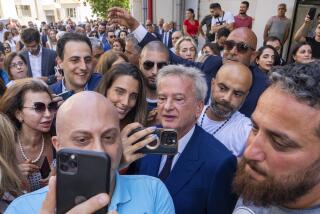Bombing Suspect Was Duped, Lawyer Says : Terrorism: Defense contends in closing arguments that key defendant in trade center blast was manipulated by a fugitive Iraqi.
- Share via
NEW YORK — A defense lawyer Wednesday described Mohammed A. Salameh, the principal defendant in the World Trade Center bombing case, as “a struggling immigrant” who was involved only because he was duped by a professional terrorist who fled the country hours after the blast.
Attorney Robert E. Precht, making the first closing argument for the defense, told jurors that the architect of the bombing was Ramzi Ahmed Yousef, an Iraqi who has been charged as a fugitive but cannot be found by the FBI.
Precht claimed that Salameh “was terribly manipulated by Yousef, an evil, devious genius who had an Iraqi passport and the wherewithal to conduct a terrorist operation on U.S. soil.” The explosion in a parking garage below street level last Feb. 26 killed six people and injured more than 1,000. It closed the trade center for weeks.
Attorneys for the other three defendants, who like Salameh are Muslim fundamentalists, will make closing statements before U.S. District Judge Kevin T. Duffy gives the case to the jury.
Federal prosecutors have insisted that Salameh and another defendant, Nidal Ayyad, a chemical engineer, paid for the purchase of explosives from a joint bank account in New Jersey and that Salameh rented and drove a yellow van that carried their homemade bomb into the trade center.
But Precht painted a far different picture, saying that Salameh had very little money. Yousef, on the other hand, flew in from Pakistan on a first-class ticket and had his own access “to sources of money in this country and abroad,” Precht said.
Without giving specifics on the funding, the defense lawyer told jurors: “Had Ramzi Yousef’s activities been traced back to Iraq, not only Yousef but Iraq would be the suspect.”
Federal authorities said last year that they had been unable to determine the source of financing from abroad. They said that at least $8,500--and perhaps 10 times that much--had been wired to Salameh and Ayyad from Germany, which has a large Arab population, but could not trace the funds further.
During 18 weeks of trial testimony, the government did not attempt to pinpoint how the funds came to Salameh and Ayyad, and the two men did not call any witnesses. Defense attorneys said only that the pair had tried to start a small business together.
Precht said that Salameh had come to the United States from the Middle East in 1988 and worked in a variety of part-time jobs “to stay here by hook or by crook. He would not have taken part in a conspiracy to blow up buildings.”
But Yousef, after arriving in September, 1992, on the same flight as Ahmad Ajaj, another of the four defendants on trial, “latched onto Salameh,” the lawyer said.
“Salameh was doing dirty work for another individual (Yousef), who did not tell him the full story,” Precht said. “He did not know his acts were intended to further a conspiracy to destroy buildings in the United States.”
Precht acknowledged that Salameh rented the van used in the blast. But he insisted that Salameh did not drive the vehicle the day of the explosion. “He rented it in his own name,” the lawyer said. “He had nothing to hide. He was innocent of any knowledge of how it was going to be used.”
More to Read
Sign up for Essential California
The most important California stories and recommendations in your inbox every morning.
You may occasionally receive promotional content from the Los Angeles Times.













